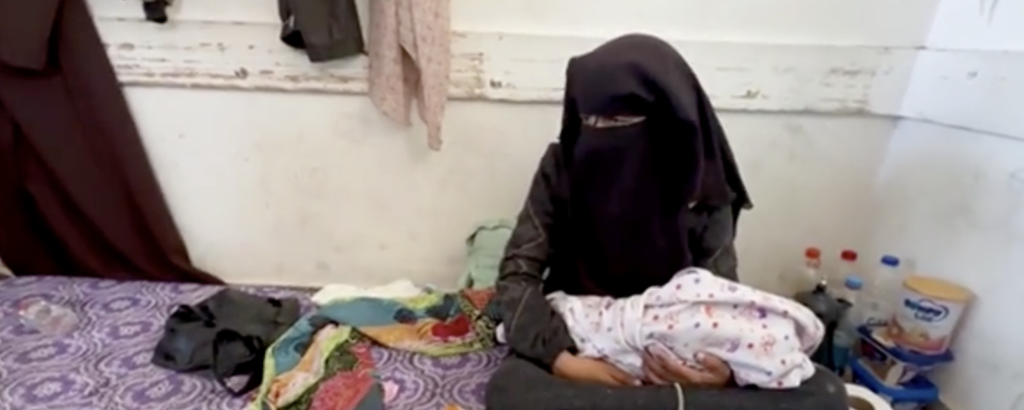In the midst of Gaza’s spiraling food crisis, tens of thousands of pregnant women are going desperately hungry. At the same time, mothers are so malnourished, they are unable to breastfeed their newborn babies. According to the Euro-Mediterranean Human Rights Monitor, 71% of Gaza’s population is now suffering from acute hunger, while 98% of people do not have enough to eat. The organization Human Rights Watch has stated that the Israeli government is using starvation as a weapon of war, with devastating effects on Gaza’s population.
The impact on pregnant women, mothers, and their young children is severe. According to recent UN data, there are 155,000 pregnant and lactating women in Gaza in need of immediate lifesaving, preventative, or curative nutrition interventions. In total, 7,685 children under five are suffering from life-threatening wasting – leaving them vulnerable to developmental delays, disease, and, in severe cases, death – while more than 4,000 are classed as ‘severely wasting’ and in need of lifesaving treatment.
On average, there is now just 1.5 liters of water per person in Gaza daily to cover all their needs, from drinking to bathing and cleaning. Yet, in addition to the minimum of 15 liters of water per day per person required for basic survival, pregnant and lactating women need another 7.5 liters of safe water daily to keep themselves and their babies healthy.
Khitam, a mother to five children, including a newborn baby, who is currently sheltering in a school in Deir Al Balah, told us she had nothing to feed her children. In a video message, she said:
“There is no water and no food to eat. My little girl has a rash on her skin due to the lack of cleanliness here. Our situation is very difficult. How do you drink water? Is it enough for you and the baby? Of course not! There is no water to drink. There is no clean water. We barely quench our thirst. I [also] have four [other] children who have been wanting to eat since the morning, but there is no bread.”
Khitam was forced to flee her home due to a bombing just two days after giving birth and ran while carrying her baby in her arms. She said:
“When the order to evacuate houses was issued…I had given birth just two days earlier. I was postpartum and tired. I had just been discharged from the hospital and [was still] bleeding. I was carrying my daughter and running. We were walking under missiles and shelling, sitting for a while to rest on the pavement and in the streets.”
People are queuing for hours in the hope of receiving food aid for their families but either return empty-handed or with barely enough to keep them alive. Inaya*, who is staying in a camp in southern Gaza with her family after her home was destroyed by bombing, said:
“For eight people, we are given three boxes of cheese with a couple of fava bean cans to last us for breakfast, lunch, and dinner.”
While the scale of need in Gaza is staggering, the amount of aid entering the territory continues to be wholly inadequate. On average, just 100 trucks carrying humanitarian supplies cross the border at Rafah daily. A second border crossing, Kerem Shalom, opened on Sunday, but on Monday, only 79 trucks entered. This is a drop in the ocean compared to the 500 trucks of aid and other supplies, which, before October 7, entered Gaza every single day.
Riham Jafari, Advocacy and Communications Coordinator at ActionAid Palestine, says:
“We are running out of words to describe the depth of the horror of what people in Gaza are having to endure. An entire population is going hungry, but pregnant and lactating women and their children are suffering the most. The stories we are hearing are harrowing.
Mothers are being forced to watch helplessly as their children scream and cry with hunger while they are utterly powerless to do anything. One mother who was so deprived of food and water that she was unable to breastfeed told us of her horror at her baby slowly turning yellow from malnourishment.
Terrifyingly, things could get worse. There is no time to waste. Each day, hundreds of people in Gaza are already dying from the bombing – soon, hundreds will also die from hunger and disease. Only an immediate and permanent ceasefire will prevent more entirely unnecessary deaths and allow food, fuel, medicine, and other humanitarian aid on the enormous scale required to enter Gaza.”
ENDS
For media requests, please email Christal.James@actionaid.org or call 704 665 9743.
Spokespeople are available:
- Meredith Slater, Director of Development for ActionAid USA
- Riham Jafari, Coordinator of Advocacy and Communication for ActionAid Palestine
About ActionAid
ActionAid is a global federation working with more than 15 million people living in more than 40 of the world’s poorest countries. We want to see a just, fair, and sustainable world in which everybody enjoys the right to a life of dignity and freedom from poverty and oppression. We work to achieve social justice and gender equality and to eradicate poverty.

